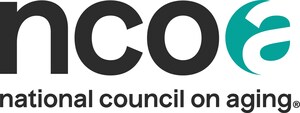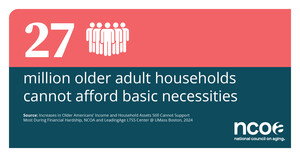WASHINGTON, Dec. 21, 2011 /PRNewswire-USNewswire/ -- While the payroll tax, physician payment fix ("doc fix"), and unemployment insurance extensions have received great attention in the media and on the Hill this week, few have focused on the fact that seniors with incomes below $15,000 per year are at risk of losing access to critical medical services if Congress does not approve the so-called "extenders package" this week.
(Logo: http://photos.prnewswire.com/prnh/20100615/NCOALOGO)
The Qualified Individual (QI) program is set to expire on Dec. 31, 2011. QI is critical to many seniors whose incomes are between 120-135% of the federal poverty level (about $13,068 to $14,702 annually for 2011). Without an extension, states would have the right to terminate benefits on Jan. 1, 2012.
The QI program pays for Medicare Part B premiums that cover physician and other outpatient services. Without QI assistance, these Medicare beneficiaries, who are struggling under the economic downturn, would be forced to spend about 10% of their limited incomes each year just on Part B premiums ($99.90 per month in 2012), or lose their Part B benefit altogether, leaving them with significant, unaffordable out-of-pocket costs every time they need to see a doctor.
Those who lose coverage will be more likely to need more expensive care at some point, such as in an emergency room, and other outpatient services. If they later decide to re-enroll, they would face the full premium plus a harsh add-on penalty.
Although about 1.5 million beneficiaries are eligible for QI protection, only about one-third actually receive it, largely due to lack of resources devoted to education, outreach, and enrollment efforts.
"Failure by Congress to extend the QI program before the New Year would be a devastating blow to 500,000 low-income older Americans," said James Firman, president and CEO of the National Council on Aging (NCOA). "It appears that Congress is preparing to put a lump of coal in the stockings of poor seniors this week, greatly increasing the burden on those already suffering."
Receipt of the QI benefit also automatically entitles individuals to the full Medicare Part D prescription drug low-income subsidy (LIS or Extra Help), which has an average value of about $4,000 in 2011. In total, the QI benefit represents an average savings of $5,199 per year for these low-income beneficiaries, who can ill-afford the rising costs of medical and drug expenses and need to use the money for other basic needs, such as housing and food. The savings are significantly more for those with high prescription drug use.
NCOA is working to find and enroll more eligible older adults into benefits like QI to help increase their economic security.
NCOA's National Center for Benefits Outreach and Enrollment helps organizations enroll seniors and younger adults with disabilities with limited means into the benefits programs for which they are eligible. The Center is funded through a cooperative agreement with the U.S. Department of Health and Human Services' Administration on Aging. Learn more at www.centerforbenefits.org.
NCOA also sponsors BenefitsCheckUp®, a free, confidential online service where individuals can find out if they're eligible for QI and other benefits to help pay for food, medicine, housing, utilities, and more. Learn more at www.benefitscheckup.org.
About NCOA
The National Council on Aging is a nonprofit service and advocacy organization headquartered in Washington, DC. NCOA is a national voice for millions of older adults—especially those who are vulnerable and disadvantaged—and the community organizations that serve them. It brings together nonprofit organizations, businesses, and government to develop creative solutions that improve the lives of all older adults. NCOA works with thousands of organizations across the country to help seniors find jobs and benefits, improve their health, live independently, and remain active in their communities. For more information, please visit: www.ncoa.org | www.facebook.com/NCOAging | www.twitter.com/NCOAging
SOURCE National Council on Aging
WANT YOUR COMPANY'S NEWS FEATURED ON PRNEWSWIRE.COM?
Newsrooms &
Influencers
Digital Media
Outlets
Journalists
Opted In






Share this article